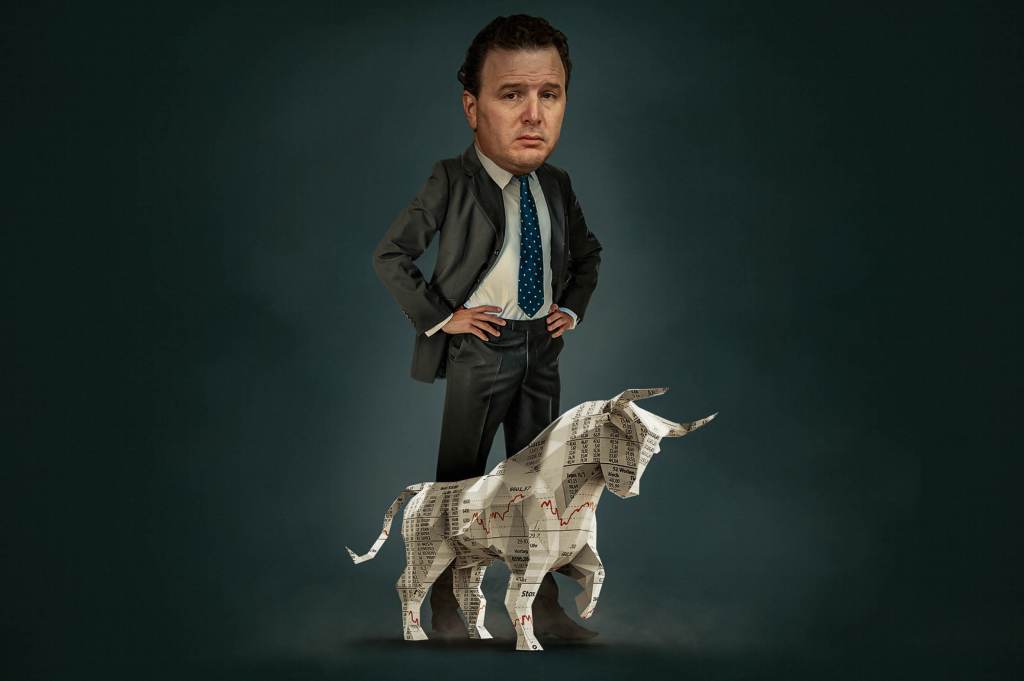Soon after the stunning news broke on June 7 that LIV Golf and the PGA were burying the hatchet, dropping the litigation between them and joining forces, my phone started blowing up. My Wall Street sources were nearly dumbstruck. The deal itself was a stunner, of course, conducted so secretly by the leaders of both the PGA and LIV that the professional golfers who make the two warring organizations possible had been clueless about what was happening.
But that’s not what my people wanted to discuss. All they wanted to talk about was how Michael Klein — a longtime Wall Street investment banker with an eponymous advisory firm, M. Klein & Co. — had once again tapped into his deep relationships with Saudi leaders and was representing them in the LIV merger with the PGA. The questions came fast and furious: can you believe this guy? How does he do it? Does he have no shame? What will he pull off next? I would like to have asked him these questions, of course. But he declined to be interviewed for this article. Through an intermediary, though, he said he would meet me — just so we could get to know each other a bit — and then he ghosted me, never following up on his offer. (In the end, his spokesman did provide some answers to my questions about him.)
Maybe Klein was too busy flying around the world refereeing the meetings between his client, Yasir al-Rumayyan, head of Saudi Arabia’s Public Investment Fund, and Jay Monahan, head of the US PGA Tour, along with PGA board members Jimmy Dunne, co-founder of the Wall Street boutique firm Sandler O’Neill (now part of Piper Sandler) and president of Palm’s Beach’s elite Seminole Golf Club; and Ed Herlihy, a longtime partner at Wachtell Lipton, the powerful Wall Street law firm. But who knows? Klein ain’t talking.
Nevertheless, he fancies himself a master of the dark arts of press manipulation. According to emails contained in documents released in July by the US Senate committee investigating the LIV-PGA merger, Klein advocated with Dunne for the controversial announcement of the deal before a definitive agreement had been reached. “If we don’t put the messages out others will fill in,” he wrote Dunne in June. “The worst thing we can do is let the naysayers lead the chorus.” He also had firm ideas about how to manipulate the press for the announcement. “I am told definitively we can have a brief, softball segment with someone like Becky Quick on CNBC (who handles Buffett),” he wrote.
Michael Klein is the Rasputin of Wall Street. Just when you think he’s down and out, he pops back up and puts himself right back in the middle of things. The LIV-PGA combination certainly will not be the biggest deal of the year — though its precise financial parameters, like so many other details, remain opaque — but it may be the most discussed and debated one. And right smack dab in the middle of it is fifty-seven-year-old Klein. His ability not only to endure but to thrive on Wall Street for nearly four decades speaks volumes about Klein’s combination of smarts, endless ambition and a bottomless narcissism that only Wall Street can reward for its charm.
Klein is relentless. He was also in the thick of the recent meltdown of Credit Suisse that resulted this year in its marriage, for a song, to UBS, its longtime rival. Klein had, improbably, joined the Credit Suisse board of directors in 2018. How that happened is another part of the amazing legend of Michael Klein.
In April 2018, longtime Credit Suisse investment banker and CFO Richard E. Thornburgh left its board of directors due to term-limit restrictions. Credit Suisse hired headhunter Mark Woodhouse to find a replacement for Thornburgh, the only actual investment banker on the board. People were contacted and interviewed. “All of a sudden they were told that the process had been terminated,” says a longtime Credit Suisse banker. “The headhunter was very apologetic, and basically said, ‘Listen, this was done completely away from us. We weren’t aware of it at all, but it appears that somewhere along the line Michael Klein intersected with Urs Rohner,’” who was then chairman of the Credit Suisse board. Suddenly, Rohner canceled the search and appointed Klein to the board. Klein didn’t even interview with Tidjane Thiam, who was CEO at the time, according to a Credit Suisse banker. Klein “completely snowed Urs,” the banker continued. “There are certain people who Michael Klein has this amazing ability to ‘work’ and get under his thumb, who basically believe Michael Klein the Second Coming of Christ on Wall Street.” (Klein’s spokesman said that Klein did interview with Woodhouse, interviewed with other board members and then had a meeting with Rohner. In an email Woodhouse confirmed his role in the process. “I sourced Michael directly myself,” he wrote.)
In October 2022 there was another surprise announcement involving Klein. Credit Suisse announced that it was getting out of the investment banking business, reversing a nearly forty-year strategic thrust that started when the bank first invested in what was known as First Boston, once an important Wall Street firm. Now it was spinning off CS First Boston into an independent investment bank and Klein was stepping down from the board of Credit Suisse and advising it on the spinoff. I’m told a group of Credit Suisse managing directors, gathered in March 2022 at the Breakers in Palm Beach, came up with the spinoff plan. Some of them think Klein “hijacked” the idea; a more charitable framing would be to say that he “adopted it” as his own. Klein’s spokesman said that Credit Suisse management and the Credit Suisse board came up with the idea of spinning off First Boston, along with M&A advisors at Centerview Partners, and that Klein worked on the idea, along with Blythe Masters, as part of the subcommittee of the board tasked with exploring it.
In any event, Klein “pushed it through at the board level,” one banker told me. The bank also announced it was commencing a lifesaving rights offering for an infusion of much-needed capital after a series of self-inflicted scandals badly tarnished the bank’s image. One of the investors in the rights offering turned out to be the Saudi National Bank, which is 37 percent owned by al-Rumayyan’s Saudi Public Investment Fund.
Four months later, in February 2023, Credit Suisse dropped yet another Michael Klein bombshell. The bank announced that it was buying Klein’s forty-person advisory boutique for $175 million, $75 million in cash and the remaining amount in an interest-bearing note convertible into equity in the new CS First Boston investment bank. (The purchase price for Klein’s firm was negotiated after Deutsche Bank performed an independent evaluation of it on behalf of Credit Suisse; I’m told the $175 million price tag was at the low end of Deutsche’s valuation range.)
What’s more, Credit Suisse announced that as part of the transaction Klein would become CEO of banking at Credit Suisse and CEO of its Americas operation, as well as joining the bank’s executive board, reporting to CEO Ulrich Körner. He was also designated as CEO of the newly created CS First Boston investment bank, when (and if) it ever came to fruition. It turns out that Credit Suisse had also paid Klein a $10 million fee for his advice on the whole package of strategic announcements.
Klein put together a PowerPoint presentation about the new First Boston for the Credit Suisse investment bankers — the “Acquisition of M. Klein & Company reaffirms and further credentializes [sic] unwavering commitment to First Boston,” he wrote — and made water bottles and T-shirts emblazoned with the logo “#backtofirst.”
“There were a few people who knew what he was about, who were a bit queasy about him,” explained one Credit Suisse banker who has known Klein a long time. “But at the same time, it was like maybe you have this kind of charismatic leader; he needs us to get rich and we need him to help carve it out to the Swiss and so on… But for most of the rank and file, who hadn’t really known him or seen him over the years, they thought this guy was great, like an inspirational kind of guy. As a salesman, this guy is awesome. When he gets up on the stage there and he’s throwing around the football with the brand, he was loving it.”
By early March, a month later, according to my Wall Street sources, along with Credit Suisse, Klein was busy trying to raise new capital of more than $500 million for CS First Boston, with private-equity firms Apollo Global Management, Standard Chartered and Atlas Merchant Capital expressing interest in investing. I’m told Klein approached Bob Diamond, the former CEO of Barclays who now runs Atlas, about investing in the revived First Boston and then “ghosted him,” according to a banker familiar with what happened. (Diamond did not respond to an email seeking comment.) Klein told Credit Suisse bankers the money he needed to stand up an independent First Boston was basically circled. “I’ve got all this money,” Klein told the Credit Suisse bankers, one remembered. “It’s already raised.” But Klein didn’t have the money, and his assurances were premature.
Klein met with 300 of the bank’s managing directors, in New York, to give them a sense of how he intended to run the independent First Boston. The new boutique would provide mergers and acquisition advice and debt and equity underwriting as well as offer leveraged finance. Sales and trading would potentially be set up as a joint venture with Credit Suisse. “You guys are the luckiest people on the planet,” Klein told the Credit Suisse bankers. “You’re with me. You had the opportunity to carve out the independent First Boston. This is better than being at Goldman before the IPO. This is the greatest.”
But on March 19, 2023, Klein’s dream of running his own independent investment bank came crashing down with the announcement that UBS would be buying Credit Suisse for $3.2 billion — a fraction of what the bank was once worth — and putting it out of its misery after 167 years. The idea of reviving First Boston under Klein’s leadership was dead. So was the idea of Credit Suisse buying Klein’s boutique for $175 million. Instead, he negotiated a breakup fee of another $20 million in addition to the $10 million he had already received.
“What I do think is astonishing is that he got paid a $10 million advisory fee by Credit Suisse to buy his own company, and then got paid a $20 million breakup fee to have the deal go away,” observed the Credit Suisse banker. “He still walked away from the whole thing with $30 million. It’s a remarkable story. He’s clearly a talented, but extremely ruthless guy.” Klein’s spokesman said he let his deal with Credit Suisse expire without collecting the $20 million termination fee.
Once upon a time, the titans of Wall Street would show up on corporate boards, to share their wisdom. Men like André Meyer and Felix Rohatyn, both former Lazard partners, and Sidney Weinberg, the former long-time senior partner at Goldman Sachs. But these days, Wall Street bankers rarely, if ever, are asked to serve on boards of directors, let alone to have a seat on the board of an industry competitor. And the idea that an investment banker who was a director would step down from the board to become the head of a spun-off division of the same bank is nearly unprecedented. (I can’t think of another example on Wall Street.)
To one Credit Suisse executive, Michael Klein’s five-year run at the bank epitomizes the man, his talents, ambitions and flaws. He is “very bright” and “incredibly adept politically,” this fellow told me. And then he got revved up about Klein. “He is a political maneuverer of the highest order,” he continued. “He’s one of the greatest stump speakers of all time, in part because facts don’t matter. He’ll just wax eloquent… But he has this amazing ability to snow a lot —a lot — of people. He can keep it going for forever… The funny thing about this whole Credit Suisse debacle, the one thing he’s wanted more than anything in the world, including more than money, is power and influence. In his mind, the ultimate position for him and what he’s coveted and craved forever is to be head of a Wall Street securities firm.” But it didn’t happen. (His spokesman said Klein is quite happy running his own boutique.)
This wasn’t the first time that Michael Klein walked away from an investment bank with millions of dollars in his pocket, just to disappear. After graduating from Wharton in 1985, Klein joined Salomon Brothers, in its mergers and acquisitions group. He thought it would be just a two-year gig. Instead, he stayed for the next twenty-three. In 1987, he helped to create Salomon Brothers’ Financial Entrepreneurs Group, which provided M&A advice as well as debt and equity financing to private-equity firms doing leveraged buy-outs, and to their portfolio companies. It was one of the earliest such focused groups on Wall Street. In 1993, Smith Barney promoted Klein to its management committee and then its investment committee. After the Salomon-Smith Barney merger, he was named to that bank’s management committee. He became co-head of the firm’s acquisition finance group after Citigroup bought Salomon Smith Barney, then co-head of European investment banking in 1999, along with Edward Miller (who declined to comment about Klein), then vice chairman of global investment banking, and then co-head of global investment banking, alongside Eduardo Mestre and Robert Morse.
Unsurprisingly for someone with a meteoric career on Wall Street, Klein rubbed a lot of his investment banking colleagues the wrong way. “Michael was always somebody of extreme intellect and talent, from the day he was an analyst,” said one former colleague. “But somebody who you never could fully put your confidence and trust because you weren’t quite sure where he was coming from.” He added, “You have to understand that it’s all about him and if you don’t know that, you’re going to find that your pocket has been picked.”
Klein billed himself around Citigroup as an M&A guy. “For all of us who know him well, we just want to put our fingers down our throat and throw up because Klein is not an M&A guy,” said one Citi M&A banker. “He’s a sponsor guy,” which is a bit of a derogatory Wall Street reference to a banker who works with private equity firms, arranging financing for their deals, but without necessarily having the skills or the intellect needed to be an M&A advisor.
Regardless, things were going great for Klein at Citigroup until July 2008 when he lost a power struggle at the top, with Vikram Pandit, who had been appointed CEO of the bank six months earlier, and John Havens, Pandit’s choice to run investment banking. “That was the end of Klein’s ambitions” at Citi, a former colleague recalled. At the time of his departure, Klein was chairman of the institutional clients group. “In typical Klein fashion,” though, the former colleague said, he walked away from Citi with a pay package, including his accrued equity, of nearly $43 million and a promise that he wouldn’t work for one of twelve Citi competitors for more than a year, nor would he solicit any Citigroup employees. Klein’s whopping severance package was nearly as big as the one received by Chuck Prince, Citigroup’s CEO before Pandit.
Corporate executives seem to love Klein: he has counted among his admirers Andrew Liveris, the former CEO of DowDuPont, Laurene Powell Jobs, the billionaire media investor and Sandy Weill, one of the greatest Wall Street conglomerators of all time and the creator of Citigroup. Urs Rohner. The Saudis. He certainly has his fans. “Michael was for me, by far, by far, the best investment banker I have dealt with,” said one. “Meaning not that he was the smartest. But that in terms of relating to clients, in terms of being able to present issues and being able to persuade people of things. As someone who can talk a good story, as they say, he was the best I’ve ever seen, ever, ever. And I’ve dealt with a lot of them.” His critics says it’s just a bunch of smoke and mirrors. They have “a blind spot for Klein,” the Credit Suisse banker continued. “There’s no one more ambitious and motivated.”
Even though the deal to sell his firm to Credit Suisse got scrapped, Klein is still wealthy, with a net worth in the hundreds of millions of dollars. And for that he probably has the idiotic Special Purpose Acquisition Company, or SPAC, craze of the pandemic era largely to thank. For those who may have missed them, SPACs were a flight of fancy that allowed “sponsors” to raise hundreds of millions of dollars from institutional and retail investors based solely on the hope that their money will be used to buy a private company and merge it into the publicly traded SPAC and then the whole shebang will trade up, up and up. Of course, it didn’t work out that way for most SPACs; quite the opposite in fact.
Klein, a former colleague recalled, “jumped on the SPAC frenzy and took advantage of it,” and though his record is spotty at best, along the way he made himself plenty rich while many of the investors got burned. Klein has raised nearly $7 billion in seven SPACs since 2018, all under the banner of something he calls Churchill Capital Corporation. (Klein is a bit of an Anglophile. He was based in London when he ran Citigroup’s European investment banking business. He was on the board of the London Investment Bankers Association and advised British prime minister Gordon Brown during the 2008 financial crisis.) Klein’s first Churchill SPAC raised $690 million and merged with Clarivate Analytics in May 2019. Clarivate’s market value is around $6.2 billion these days and its stock is down around 33 percent since its May 2019 merger with Klein’s SPAC. “He made a lot of money on that,” one SPAC banker told me. “That made investors a lot of money.” (A source close to Klein said the Clarivate deal is the only SPAC Klein sold stock for tax reasons and did well.)
Klein appeared to have hit the SPAC jackpot — for a while anyway — with Churchill Capital IV, which in July 2021 merged with Lucid Motors, the luxury electric car maker. Lucid’s market value is still $14 billion but the company’s stock is down about 73 percent since it merged with Klein’s SPAC, and down 88 percent since Lucid’s all-time high last November.
Klein’s next three SPACs — Churchill Capital Corp. V, VI and VII — have a total of around $2.2 billion in dry powder that Klein raised from investors who hoped that he could put the money to work before the two-year SPAC clock expired. Klein won a reprieve for Churchill V until December 18, and Churchills VI and VII until February 2024. (On August 2, Churchill VII announced a $1.6 billion deal for a UK mini-conglomerate, CorpAcq.) But with the SPAC craze played out, and pretty much discredited, it seems likely that his remaining SPACs will expire, with Klein returning the money to investors, plus interest, and having to eat around $50 million in underwriting costs himself. He also raised another $500 million in a SPAC — AltC Acquisition Corporation — with Sam Altman, the co-founder and CEO of OpenAI. That SPAC agreed in July to merge with Oklo, a nuclear fission startup, in a $850 million deal.
“The thing that amazes me is the guy has no history, none, zero as an investor, as somebody to pick winners and to put money into situations and to buy companies,” the old colleague told me. “He has no history. So, his ability to get people to back him and particularly to put money into these things, is attributed to his skill set, in my opinion. How he can convince people to do things when they really should look at the facts as opposed to look at the spin master at work. Why would anybody provide capital to somebody who’s never done this before? Why would you do that? If you want to be fair, the guy’s an extraordinary promoter and salesperson and he can talk people into doing things that you’re amazed that they did them.” (Klein’s spokesman noted that Klein never went on CNBC to hawk his SPACs, like many other SPAC sponsors.)
Having met any number of ethically challenged people on Wall Street during my seventeen years in the left ventricle of capitalism, I wondered just how bad Michael Klein’s ethics and morals could really be, especially since I have never met the guy, although not for a lack of trying. I have known more than my share of investment bankers over the years — worked with them, written about them — and there’s no one who evokes the kinds of admiration and loathing that Michael Klein does.
This article was originally published in The Spectator’s October 2023 World edition.

























